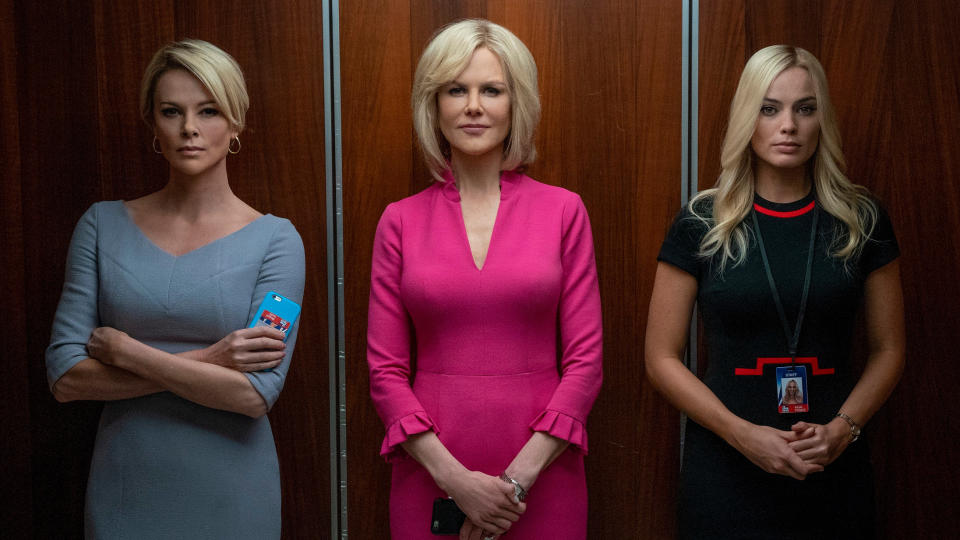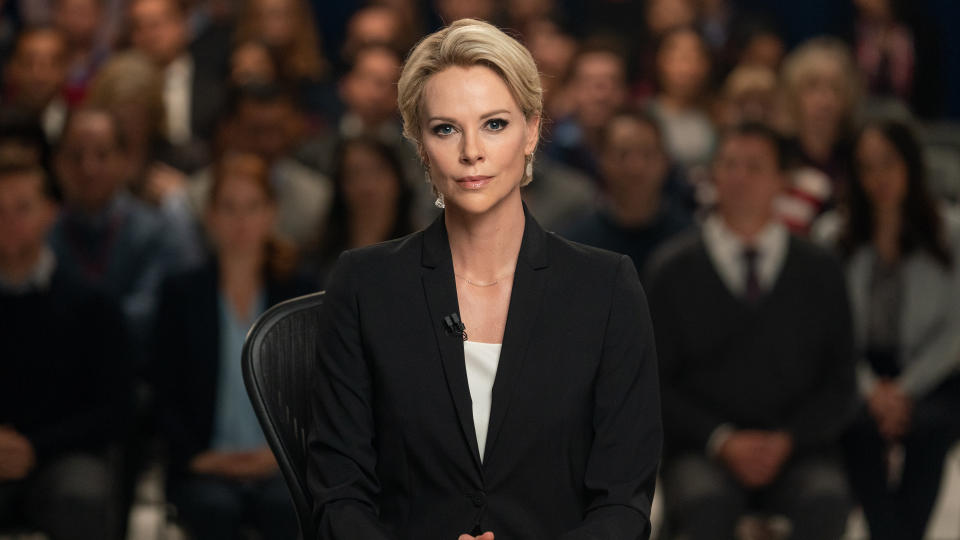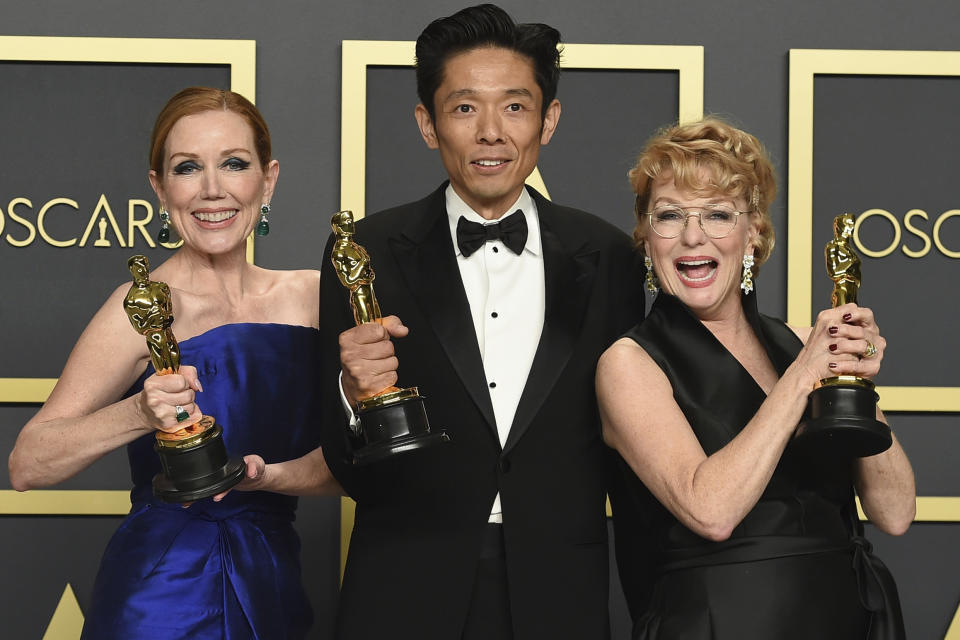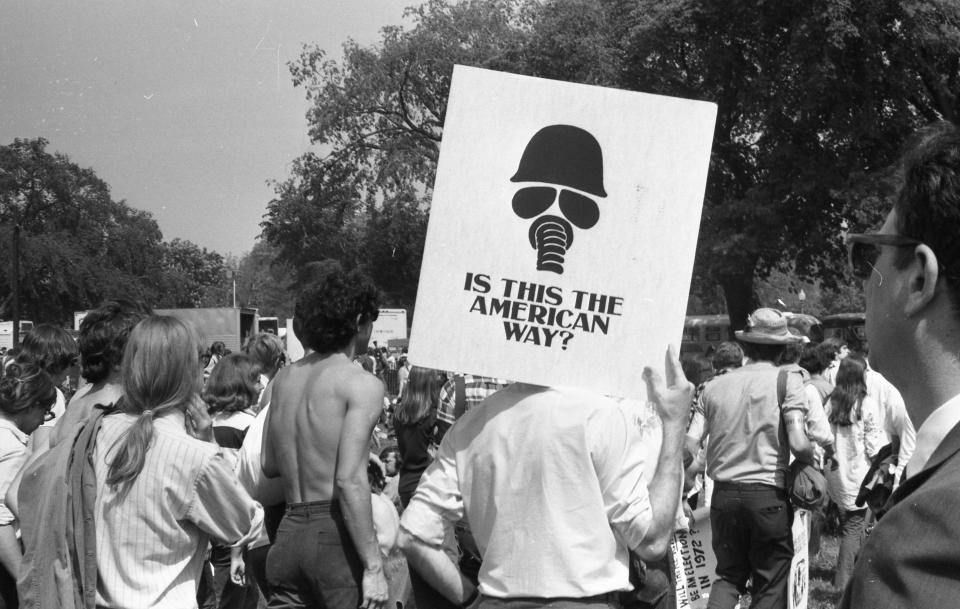'Bombshell' director Jay Roach: Charlize Theron's transformation into Megyn Kelly 'short-circuited' my brain (exclusive)

Bombshell director Jay Roach says Charlize Theron’s performance as former Fox News anchor was so convincing that it messed with his head.
Roach is promoting the DVD release (it’s out on digital now) of his #MeToo era drama, which was nominated for three Oscars for telling the story of allegations of abuse made against Fox News CEO Roger Ailes.
The director made his name as the man behind all three part of the Powers trilogy, but has since shifted gears into more serious material with Bombshell and Trumbo.
He told Yahoo Movies UK he thinks Theron’s Oscar-nominated performance went beyond uncanny.
“When she was practising the voice and the mannerisms, she was not Charlize Theron looking and sounding like Megyn, she was Megyn,” the 62-year-old said.
He adds that the film’s Oscar-winning make-up and hairstyling from Kazuhiro Tsuji, Anne Morgan, and Vivian Baker was also unparalleled.

“I didn’t see the whole thing come together until late because they saved showing me the whole look all at once. It was mind-blowing because, even though they are relatively subtle, the difference between vaguely evoking Megyn to ‘oh my God, is that Megyn?’ creates a short circuit in your brain. I know that’s Charlize Theron, but she’s so converted that I’m so confused,” he adds.
Read more: Most incredible actor transformations of 2019
“That’s how audience reacted too. You can hear people begin to murmur a few minutes in because they think they’re watching archival footage. I’ve done a lot of these films where we convert and transform people, but that’s by far the most uncanny we’ve ever got to.”
Read our full interview with Jay Roach as he discusses the response to Bombshell, how he’s coping with coronavirus lockdown and his reaction to first seeing Charlize Theron’s uncanny portrayal of Fox presenter Megyn Kelly...
Yahoo Movies UK: It must be strange to be in the film industry right now because I guess everything has just stopped?
Jay Roach: Yeah. I wasn’t in production on anything and we had just wound down all of the publicity stuff on the release of our film, so it didn’t affect us as seriously as some of my other friends. The people I worry about are the crews and the cast who work show-to-show because there’s no steady work for them.
That’s what’s really concerning, how many people who depend on production to keep going are definitely stranded at the moment. Writers and development people can possibly keep going if they have shows, but it’s tough for crews and cast.
When Bombshell came out, a lot was made of it being the first film of the #MeToo era. Was that something that was weighing on your mind while you were making it?
To some extent, yes. Charles Randolph had started writing the script before the Harvey Weinstein news broke but, by the time Charlize Theron and I got involved in February 2018, that was definitely on everybody’s minds.
Read more: Theron says outlet failed to print famous harasser’s name
One of the reasons I thought the story was interesting is that these women stood up and spoke out against Roger Ailes a full year before the Harvey [Weinstein] news broke. So when they did speak up, they didn’t have much guarantee of any popular support whatsoever. It wasn’t a trend towards the media or large numbers of women speaking up on social media to back people up until after the Harvey news broke.
So when Gretchen Carlson [played by Nicole Kidman] chose to pursue Roger Ailes, it was a big deal and pre-dated the bigger wave by a solid year. That of course makes the suspense of whether Megyn Kelly and the other women at Fox will speak up all the more palpable because that’s the only chance Gretchen has to get any support at all. In retrospect, after the Harvey news, it’s interested to be reminded that this all happened that way.
Were you conscious, as a man directing a script from a male writer, that there was going to be some pushback?

Absolutely. We definitely were aware of how that might sound. But that story kind of undervalues Charlize Theron’s role in the whole thing. She’s the one who put us all together. Charles had certainly started the script, but she was the one who sent the script to me and then was a very active producer and collaborator as an actor. She brought in some of the other women — Margot Robbie and Nicole [Kidman] — and then we all worked together to bring in the whole cast.
It was a collaboration. Many of our producers, above the line people, crew and department heads were women. Charles and I were at least wise enough to know that we weren’t going to be doing this alone. I wasn’t particularly, as a director, going to be any kind of an auteur or autocratic, stereotypical director. It was going to be about listening to our collaborators and acknowledging that we had so much to learn to figure out how to tell the story.
Read more: Theron felt conflicted about playing Megyn Kelly
Maybe even the most important thing that we recognised was that we had to talk to the women involved and listen very carefully. We talked to as many as we could get hold of. The main thing that occurred to us was that we don’t know nearly enough to tell this story by ourselves. No film ever really is that but, in this particular case, it was even more of a collaboration than usual. Again, Charlize was a sort of fearless leader who held us together and kept us honest.
Charlize’s voice came through very strongly as the movie was being promoted and her performance is really something special. When you first saw her in full character as Megyn Kelly, with the Kazu Hiro make-up job, what was your first reaction?

I was astonished. I had debated with her over whether we needed extensive prosthetics to convert her into a plausible Megyn Kelly. She already looked a fair amount like her and I thought the audience might just go along with it without any prosthetic make-up. She told me that it felt important to her because, although it would take extra time and extra money to pull it off, it would be worth it because she could look at herself in the mirror and feel like somebody else. So when she was practising the voice and the mannerisms, she was not Charlize Theron looking and sounding like Megyn, she was Megyn.
Of course, I always try to give the actors everything they need to do what they do. She had access to Kazu Hiro, the make-up artist, and he’s so brilliant. He helped me overcome some of my concerns right away by reassuring me that it wouldn’t step on her performance and it wouldn’t make her uncomfortable. It would definitely take a little time, but he could speed it up. He gave me a lot of reassuring thoughts.

So we went with it. He’s an actual sculptor on top of being a make-up person, so he just has this incredible ability to finesse the look and the technique. I didn’t see the whole thing come together until late because they saved showing me the whole look all at once. It was mind-blowing because, even though they are relatively subtle, the difference between vaguely evoking Megyn to “oh my God, is that Megyn?” creates a short circuit in your brain. I know that’s Charlize Theron, but she’s so converted that I’m so confused.
Read more: Most incredible actor transformations of 2019
That’s how audience reacted too. You can hear people begin to murmur a few minutes in because they think they’re watching archival footage. I’ve done a lot of these films where we convert and transform people, but that’s by far the most uncanny we’ve ever got to.

The make-up is great, but it’s a credit to her. She is such a master. Her performance is so complete. It wouldn’t work if it was just great make-up. It’s how she interpreted the character that really made it work.
I wanted to ask about the response to that performance. There was some criticism that the movie was too kind to Fox and Megyn, whereas she herself was broadly positive with some criticisms. What was your take on that response and to the response in general?
I respected where she was coming from. I thought it was really interesting and compelling that she filmed the other women responding. She let them connect with the film. I had already spoken to Rudi Bakhtiar. She’s the woman in our film where you hear her thoughts as she’s being hit on in that hotel bar and then gets fired. I knew that Rudi thought the movie was incredibly authentic and I knew that the women we were in contact with thought it was authentic.
The one that made me think hard about how we had gone at it were her comments about whether it was fair to have her in the scene with Margot Robbie be accused of not necessarily being as supportive of the other women as she could have been, given she had waited 10 years to speak up about Roger’s abuse.
Megyn had said, even in her own book, that the dilemma had haunted her, so we thought that was fair. She definitely raised that issue of whether it was fair but I respected that, despite her husband saying she would take that out, she said in her video that she was glad they kept it in because she had always been haunted by that question.

I admired the honesty of that. It would have been easy to just say: “oh, I would have never thought like that”. In these docudramas, we try to get to the essence of things. When we don’t have access to all of what went on, we do the best we can based on educated guesses. We warn the audience up front that there are composite characters and licence is taken. We hope the audience remains skeptical.
I wasn’t discouraged by her reaction. I felt, in total, it was validating of what the movie was trying to say.
You mentioned at the start that you don’t have anything already in production, but do you know what you’re working on next?
No, not for sure. But we’re working on the scripts for a limited series about the 1970 shootings at Kent State University, where the National Guard opened fire on Vietnam War protesters. It was a turning point in our country and a very traumatic part of our history. There have been documentaries and a TV movie, but what we want to do is a limited series that explores what happened in depth.

I was inspired by seeing the series about Chernobyl. That was obviously about a nuclear meltdown and this is about a social and political meltdown, right in the heart of America. That show made me think we could go deeper in exploring all of the factors that contributed to that tragedy.
That’s the scripts we’re working on now. We don’t have a commitment, but we’re very interested in trying to get it made.
That sounds really interesting. I hope it goes well.
Thank you so much. I didn’t end on the comedic note! It’s interesting. I do want to go back and do comedies, but I feel compelled to understand what’s going on. I think the Kent State story, though it’s historical, is definitely relevant today because it’s all about how language kills.
Read more: Chernobyl costume company donating PPE in coronavirus fight
They demonised war protesters to the extent that they made other kids, who were also trying to avoid the war by being in the National Guard, feel okay about shooting kids who were against the war. The whole idea of how language and using demonisation and otherising can lead to violence is an example of something I’m trying to figure out.
I don’t know when I’ll get over that compulsion, to get back to comedy, but I do hope to some day.
Bombshell is available now on digital and on 18 May on Blu-ray and DVD, from Lionsgate Home Entertainment.

 Yahoo Movies
Yahoo Movies 
